Lee MB Pursues Reconciliation Policies
Urges Denuclearization for Progress in Inter-Korean Ties
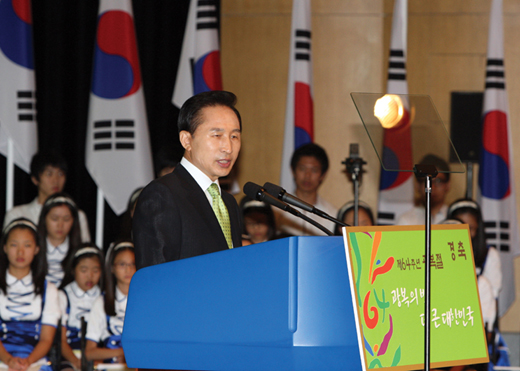
President Lee Myung-bak is renowned for his relentless pursuit of "pragmatic" policies in coping with various pending issues such as the lingering economic difficulties and relations with foreign nations.
Such a focus on practical steps has been successful up until now as seen in the recent signs of economic recovery, seemingly boosted by a series of stimulus packages including the expanding public works projects.
Korea has shown the fastest recovery from the current global financial crisis among the member nations of the Organization of Economic Cooperation and Development (OECD), thanks to the pump-priming measures and economy-first steps.
In the course of tackling economic issues, critics have denounced Lee for treating domestic political issues including inter-Korean matters as less important.
But the recent development involving the death of former president Kim Dae-jung seems to have helped clear Lee of such a negative view.
First, he permitted the 'national funeral' for Kim in defiance of fierce opposition from conservative forces in full recognition of Kim's contribution to the nation's democracy and reconciliation with North Korea.
Lee also agreed to meet with North Korean officials who were dispatched for the funeral ceremony, raising hope for the possible improvement in inter-Korean relations while putting an end to the impasse.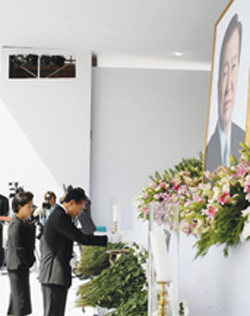
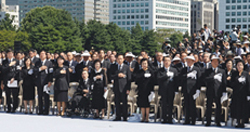
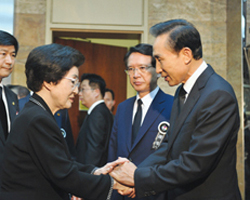
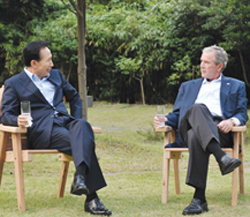
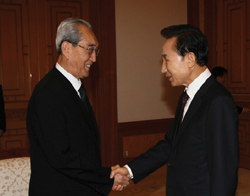
Hundreds of thousands of people paid their respects to the late former president at altars set up across the nation for the six days leading up to Sunday's state funeral, many of whom hope his death will be a catalyst for reconciliation.
"I hope his death will serve as leverage to overcome political regionalism and bridge social rifts," read one of the hundreds of messages posted on a makeshift board in front of the National Assembly, where the late president's funeral ceremony was held on Sunday, Aug. 23.
"As his nickname 'indongcho' (a plant that endures the harsh winter) testifies, he survived and overcame various ordeals and laid the foundation for democracy. To his last breath, his concern was about democracy and reconciliation with the North. It's our job to create a more harmonious society," said Lee Nam-soo, a 45-year-old office worker.
As indicated in their wishes, regionalism and conflicts among those with different provinces of origin, in particular those in the southeastern and southwestern parts of the country, have been major obstacles interrupting further advancement of South Korean politics in past decades.
However, a growing number of citizens and politicians are demanding that his death be seen as an opportunity to move away from the archaic yet lingering regionalism and seek a "grand harmonization." Representatives of a funeral committee in South Jeolla Province, the late Kim's hometown and political stronghold, first spoke in favor of the idea Sunday.
"Regionalism has been a key obstacle interrupting inter-provincial harmonization and Korean politics," a spokesman for the committee said in a statement. "It will take time to get rid of it. But we should take his death as an opportunity to seek a breakthrough."
Ven. Jusun, who represents another committee for the funeral in Gwangju, also said, "Politicians, especially from the opposition Democratic Party, whose support base is the southwestern part of the country, should overcome the limits to bring together citizens who are divided by their provinces of origin."
President Lee also cited the importance of reconciliation in his address to the nation on the occasion of the 64th anniversary of the National Liberation from Japanese colonial rule. He also underlined the need for the people to have a new attitude in dealing with the fresh challenge that is coming.
"About 90 years ago, our ancestors, who had then lost their country, established a government in exile in Shanghai, showing the world that Korea was an independent country that would not tolerate being governed by foreign forces," he said.
He said "Korean citizens are heroes who have always discovered hope and opportunities in the bleakest moments over our 60 years of modern history. Every single Korean is a hero. The spirit of our ancestors who dedicated themselves to recovering our country, establishing our country and defending our country still lives on today and is probably one of the most valuable things we have inherited.
"Today I would like to shed new light on how Koreans made a history of miracles within the larger frame of world history. In 1948, we established the Republic of Korea as a new member of the international community. But we were still a small country then. Barely two years after the founding of modern Korea, the nation suffered the Korean War. We were at the receiving end of help from other countries, and Korea became synonymous with war and poverty," he added.
The 21st century is seeing changes in the world. It is often referred to as an age of globalization. It is also an age that puts emphasis on freedom and a green environment. A single nation's interests can no longer be viewed in isolation from the universal interests of the global community, said Lee.
He also said, "Becoming a Korea that firmly marks its place on the global scene requires competence in aligning our national interests with those of the global community. It also requires a fine sense of balance and an ability to put the complex interests involving the region and beyond in perspective. We also need to proactively present a new vision for the future, one that would sketch out the history of human civilization in the 21st century. Respecting universal values and an international order that regards the global community as one big family is what would be both practical and engaging to all.
"Korea is a strong presence in the world. It is also referred to as a country that represents hope and unlimited possibilities. However, looking inside at what is going on within the country, we realize that all is not that rosy. We have paid a high price in establishing democracy, in weakening the deeply entrenched authoritarianism, while improving fairness and enhancing transparency in government, but we still have some way to go. Not only is the peninsula divided in two, there are also conflicts among regions and between management and labor. All these conflicts are playing out in the extreme.
With regard to regionalism he said, "If we sincerely want to eradicate negative regionalism, we must change the electoral system. No matter how much we talk about rooting out regionalism, if the election system remains as it is, pulling everyone together will be a far-fetched dream. It would be like trying to cure a patient in need of surgery with mere painkillers. Everybody sees the problem, yet the problem has persisted for a long time. There is a need to redefine electoral jurisdictions so that the members of the National Assembly can focus on what they are supposed to do instead of paying excessive attention to regional interests the way they have done so far.
He urged North Korea once again to realize that nuclear weapons cannot guarantee its security, but rather are an obstacle to a better future for them.
"I hope the North and South will have a candid and frank dialogue about what it will take for North Korea to give up nuclear weapons. I hope to find a way that allows North Korea to defend itself, but also allows both the North and South to prosper together. When the North shows such determination, my Administration will come up with a new peace initiative for the Korean Peninsula. We will actively seek an international cooperative program to ensure economic development in the North to enhance the quality of life for the North Korean people. We will establish a high-level meeting between the two Koreas to realize a common economic community in the coming years and will pursue development projects focused on five major areas ¡ª the economy, education, finance, infrastructure and quality of life ¡ª in cooperation with other countries and international organizations," he said. "Along with the denuclearization of the Korean Peninsula, a reduction in conventional weapons must also be discussed. It is unprecedented for such numbers of heavy artillery and troops to be amassed along the narrow four-kilometer-wide DMZ for more than half a century. How can we possibly talk about reconciliation and cooperation when we are on trigger alert with millions of weapons aimed at each other? Only when we reduce the number of weapons and troops and redeploy them to the rear, will we be able to take a step forward to genuine peace. In addition, if the North and South reduce conventional weapons and troops, enormous resources will be freed up to improve the economies on both sides. Now is the time for the North and South to come to the table and talk about these issues. I would like to say clearly that my Administration is ready to start talks and cooperation with the North over all issues between us, at any time, at any level," he added. nw
President Lee Myung-bak delivers a speech at a ceremony to celebrate the 64th anniversary of Korea's liberation from Japanese colonial rule on Aug. 15 at Sejong Center in downtown Seoul.
(clockwise) President Lee Myung-bak and First Lady Kim Yoon-ok offer flowers at an altar for the late former president Kim Dae-jung at the National Assembly on Aug. 21; President Lee and other dignitaries attend the funeral of the late ex-president; President Lee consoles Lee Hee-ho, widow of the late former president Kim Dae-jung on Aug. 21; President Lee meets with Kim Ki-nam, a secretary of North Korea's ruling Workers' Party, who headed a North Korean delegation to pay their respects to the late ex-president, at Cheong Wa Dae on Aug. 23; and President Lee talks with the visiting former U.S. president George W. Bush at a hotel in Jeju on Aug. 2.
Photo by courtesy of the MCST
3Fl, 292-47, Shindang 6-dong, Chung-gu, Seoul, Korea 100-456
Tel : 82-2-2235-6114 / Fax : 82-2-2235-0799